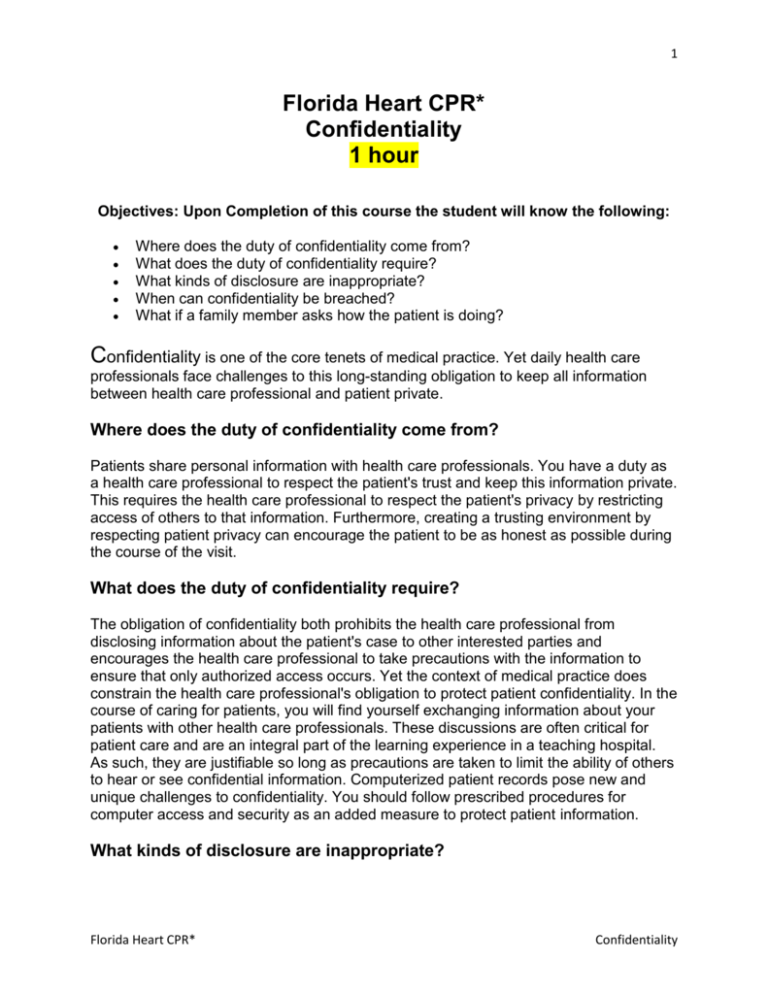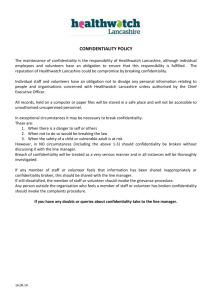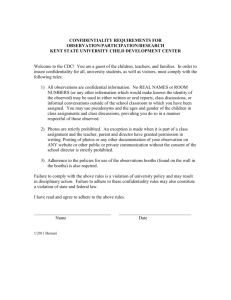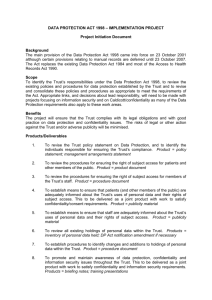Confidentiality (1)
advertisement

1 Florida Heart CPR* Confidentiality 1 hour Objectives: Upon Completion of this course the student will know the following: Where does the duty of confidentiality come from? What does the duty of confidentiality require? What kinds of disclosure are inappropriate? When can confidentiality be breached? What if a family member asks how the patient is doing? Confidentiality is one of the core tenets of medical practice. Yet daily health care professionals face challenges to this long-standing obligation to keep all information between health care professional and patient private. Where does the duty of confidentiality come from? Patients share personal information with health care professionals. You have a duty as a health care professional to respect the patient's trust and keep this information private. This requires the health care professional to respect the patient's privacy by restricting access of others to that information. Furthermore, creating a trusting environment by respecting patient privacy can encourage the patient to be as honest as possible during the course of the visit. What does the duty of confidentiality require? The obligation of confidentiality both prohibits the health care professional from disclosing information about the patient's case to other interested parties and encourages the health care professional to take precautions with the information to ensure that only authorized access occurs. Yet the context of medical practice does constrain the health care professional's obligation to protect patient confidentiality. In the course of caring for patients, you will find yourself exchanging information about your patients with other health care professionals. These discussions are often critical for patient care and are an integral part of the learning experience in a teaching hospital. As such, they are justifiable so long as precautions are taken to limit the ability of others to hear or see confidential information. Computerized patient records pose new and unique challenges to confidentiality. You should follow prescribed procedures for computer access and security as an added measure to protect patient information. What kinds of disclosure are inappropriate? Florida Heart CPR* Confidentiality 2 Inappropriate disclosure of information can occur in clinical settings. When pressed for time, the temptation to discuss a case in the elevator may be great, but in that setting it is very difficult to keep others from hearing the information exchanges. Similarly, extra copies of handouts from teaching conferences that contain identifiable patients should be removed at the conclusion of the session. The patient's right to privacy is not being respected in these sorts of cases. When can confidentiality be breached? Confidentiality is not an absolute obligation. Situations arise where the harm in maintaining confidentiality is greater than the harm brought about by disclosing confidential information. In general, two such situations that may give rise to exceptions exist. In each situation, you should ask - will lack of this specific information about this patient put a specific person you can identify at high risk of serious harm? Legal regulations exist that both protect and limit your patient's right to privacy, noting specific exceptions to that right. These exceptions follow. Exception 1: Concern for the safety of other specific persons On the one hand, the 1974 Federal Privacy Act restricts access to medical information and records. On the other, clinicians have a duty to protect identifiable individuals from any serious threat of harm if they have information that could prevent the harm. As mentioned above, the determining factor in justifying breaking confidentiality is whether there is good reason to believe specific individuals (or groups) are placed in serious danger depending on the medical information at hand. The most famous case of this sort of exception is that of homicidal ideation, when the patient shares a specific plan with a health care professional or psychotherapist to harm a particular individual. The court has required that traditional patient confidentiality be breached in these sorts of cases. Exception 2: Concern for public welfare In the most clear cut cases of limited confidentiality, you are required by state law to report certain communicable/infectious diseases to the public health authorities. In these cases, the duty to protect public health outweighs the duty to maintain a patient's confidence. From a legal perspective, the State has an interest in protecting public health that outweighs individual liberties in certain cases. In particular, reportable diseases in most states include (but are not limited to): AIDS and Class IV HIV, hepatitis A and B, measles, rabies, tetanus, and tuberculosis. Suspected cases of child, dependent adult, and elder abuse are reportable, as are gunshot wounds. Local municipal code and institutional policies can vary regarding what is reportable and Florida Heart CPR* Confidentiality 3 standards of evidence required. It is best to clarify institutional policy when arriving at a new site. What if a family member asks how the patient is doing? While there may be cases where the health care professional feels compelled to share information regarding the patient's health and prognosis with, for instance, the patient's inquiring spouse, without explicit permission from the patient it is generally unjustifiable to do so. Except in cases where the spouse is at specific risk of harm directly related to the diagnosis, it remains the patient's, rather than the health care professional's, obligation to inform the spouse. Confidentiality: Case 1 Your 36-year-old patient has just tested positive for HIV. He asks that you not inform his wife of the results and claims he is not ready to tell her yet. What is your role legally? What would you say to your patient? Confidentiality: Case 1 Discussion Because the patient's wife is at serious risk for being infected with HIV, you have a duty to ensure thatshe knows of the risk. While public health law requires reporting both your patient and any known sexual partners to local health officers, it is generally advisable to encourage the patient to share this information with his wife on his own, giving him a bit more time if necessary. Confidentiality: Case 2 A 75-year-old woman shows signs of abuse that appears to be inflicted by her husband. As he is her primary caregiver, she feels dependent on him and pleads with you not to say anything to him about it. How is this case different from Case 1? How would you handle this situation? Confidentiality: Case 2 Discussion In this case, the required reporting laws can be interpreted in a number of justifiable ways. The laws supporting reporting elder abuse (and child abuse) allow you to break Florida Heart CPR* Confidentiality 4 confidentiality and report suspected abuse. However, if you think it is possible to give this woman support and access to other services without reporting the case immediately, those alternatives will help her more in the long run. Either way, you have an obligation to address her abusive situation. Confidentiality: Case 3 A 60-year-old man has a heart attack and is admitted to the medical floor with a very poor prognosis. He asks that you not share any of his medical information with his wife as he does not think she will be able to take it. His wife catches you in the hall and asks about her husband's prognosis. Would you tell his wife? What are you required to do legally? Confidentiality: Case 3 Discussion The duty to maintain confidentiality remains strong in this case as information about the patient's health does not directly concern others' health, welfare, or safety. There is no imminent danger to others here. However, the wife is certainly affected by her husband's health and prognosis and every effort should be made to encourage an open dialogue between them. It remains his responsibility to do so. Florida Heart CPR* Confidentiality 5 Florida Heart CPR* Confidentiality Assessment 1. Patients share personal information with health care professionals. This requires the health care professional to respect the patient's privacy _______to that information. a. by restricting access of others b. by only informing their healthcare staff c. by only telling a few people d. by not telling their families 2. ________ patient records pose new and unique challenges to confidentiality. a. Paper b. The abundance c. Unofficial d. Computerized 3. Confidentiality is not an absolute obligation. Situations arise where the harm in maintaining confidentiality is greater than the harm brought about by disclosing confidential information, such as: a. Concern for the safety of other specific persons b. Concern for public welfare c. Concern for the physician’s reputation d. Both a and b 4. Creating a trusting environment by respecting patient privacy can encourage the patient to be as _____ as possible during the course of the visit. a. Pleasant b. Honest c. Satisfied d. Helpful 5. Reportable diseases in most states include: a. Measles b. HIV/AIDS c. Influenza d. A and B Florida Heart CPR* Confidentiality







